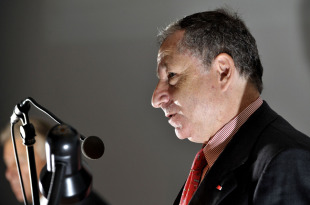- The Inside Line
Let's get lexical

The English language is a funny thing. I remember as a child having my mind blown when we were taught that the Sahara Desert was a redundancy - Sahara means desert in the local vernacular, so Anglophones the world over call that big mass of heat and sand the Desert Desert.
Playing around with words often leads to similar redundancies, something I learned from my poet sister, who spends her life stretching vocabulary to prove a point. Were it not for that all-important 'e', Formula One would be governed by the Agreement Agreement, an amusing name for a document whose signing is borne of months - years, even - of disagreements, arguments, and negotiations.
At long last, the FIA and FOM have announced that the Concorde Agreement has been signed, a mere nine months after the last version expired. And while the pat statements released to document the signing talk of cooperation, of mutual benefit, and all the other standard nonsense we see in press releases, there is no doubt that this particular agreement represents a victory for the FIA.
While the precise details of the new Concorde will never be publicly released, the news coming out of Dubrovnik suggests that FIA president Jean Todt has secured two very important things for the Federation he currently governs: more money, and more power. And while mo' money might mean mo' problems in '90s movie vernacular, when combined with more power it simply means more responsibility.
The timing of this new agreement provides a much-needed boost to Todt's re-election campaign, which has so far been rather low key. And while any other candidates will seek to use the new Concorde for their own political ends, the fact that Todt has (at long last) been able to secure more power for the FIA will help the Frenchman to secure a number of wavering loyalties - particularly among those members with a vested interest in Formula One.
For the first time in a long time, the FIA and FOM will have an equal amount of influence when it comes to determining the future direction of Formula One, while (some of) the teams are also gaining in power. The creation of a new F1 strategy group will see FOM and the FIA each controlling six votes, while six of the sport's eleven teams will also have a vote apiece. Should the FIA and FOM find themselves opposed, it will be the teams who will hold the balance of power.
This new strategic commission will not displace the WMSC, meaning that members of the World Motor Sport Council have no loss of power to fear in this brave new world. Whatever changes or additions to the F1 rulebook that are mooted by the F1 strategy group can be supported or rejected by either the WMSC or the F1 Commission, but they cannot be modified. In this way the WMSC - which counts Bernie Ecclestone among its members - will still remain the most powerful body in motorsport, but F1's six big teams now have greater sway.
The difficulty comes for the five teams left out in the cold. What little influence they had previously (effectively none in the case of Marussia, who have been treated with ceaseless derision by the commercial rights holder) has now disappeared. Politically that makes them ripe for the picking by any presidential hopeful, but the teams don't vote in FIA elections.
The best that they can hope for is that the next FIA president - be it Todt, declared candidate David Ward, rumoured candidate Mohammed bin Sulayem, or someone else entirely - will see the potential gains in treating all of the teams as equal, irrespective of the power that they truly hold.

